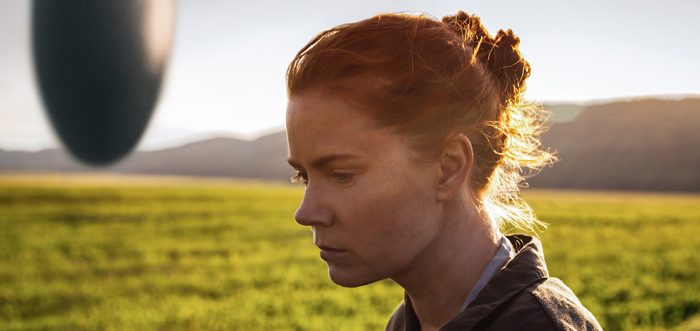
Hollywood has dropped its annual big-budget, brooding science-fiction flick around this time for the past three years now. Gravity started the trend in 2013, followed by Interstellar in 2014, while last year gave us The Martian. Critics snootily call them ‘sci-fi flicks for thinking people’ and they usually garner fairly large followings, charming mainstream moviegoers with forceful but effective emotional subtext. Arrival is the latest of the sort, and while it’s far from a behemoth like Interstellar in scale, it tries for a similar equipoise between personal meditation and hefty sci-fi spectacle. For the most part, it succeeds.
Arrival tells of a mysterious alien incursion, whereby twelve extra-terrestrial spaceships touch down across Earth with unknown intentions. The plot resembles The Day the Earth Stood Still on paper, but comes closer to Close Encounters of the Third Kind when we meet a linguist, Louise Banks (Amy Adams), who is employed by the American government to learn how to communicate with the aliens—dubbed heptapods, on account of their sevens arms. Louise proceeds to learn their language as a diplomatic breakdown between the invaded countries looms, even as she’s haunted by memories of her daughter dying of a rare disease.
Director Denis Villeneuve has made a name for himself with films like Prisoners, Sicario and his strongest work Enemy, and each have a unique, edge-of-your-seat chemistry. Villeneuve is an adept collaborator, complementing his tense filmmaking style with artists that provide stunning cinematography and eerie scores. Arrival’s aesthetic components are no different: . DP Bradford Young and composer Jóhann Jóhannsson contribute impressive work, as do the production designers, with both the modernist architecture of the ships and the claustrophobic corridors of the military tents.1
Arrival is at its best early on, when everything is—figuratively speaking—up in the air. Adams nails Louise’s initial trepidation and emotional anxiety, followed by her growing obsession. The film’s opening, from the first sightings to the expedition into the spacecraft, is masterful, feeling both very real and very intimate. Mystery is Villeneuve’s friend; narrative, less so. While it’s fascinating at first to see Adams interact with the aliens and go through the building blocks of language, the paradox of so-called ‘smart’ sci-fi films is that they feel the need to explain their plots unremittingly, and unfortunately that’s what happens here. Whiteboard explanations and montages ensue and—just in case you missed anything—we’re granted an abrupt voice-over catch up from scientist Ian Donnelly (Jeremy Renner), a character so underwritten that he feels like a parody of the underdeveloped woman who traditionally occupies the love interest in this sort of film. And for a film about linguistics, a lot of screenwriter Eric Heisserer’s dialogue comes off as laughably corny. Donnelly and Forest Whitaker’s Colonel Weber are the worst offenders, but the clichés are shared around.
Before you know it, Louise has developed a Google Translate for the alien’s language and we’re thrust into a final third that is bogged down in international diplomacy. The story is based on a novella by Ted Chiang called Story of Your Life, which is where it inherits its basic premise and philosophical themes, but the geopolitical conflict is a rather unfortunate appendage created for the film. Arrival would have been better off sharpening its focus on Louise and Montana (where the ship landed in America; strange choice), but at least the international relations elements aren’t too overbearing. It’s also an opportunity for Villeneuve’s trademark understated socio-political commentary, as Louise stands up to the macho echelons of the US military—much like Emily Blunt’s character does in Sicario.
Chiang’s novella plays with tense and determinism throughout, which the film emulates by way of visions, flashbacks and, ultimately, rug-pulling. The structure is quite effective, particularly early on, when Villeneuve plays intimate, moving moments between Louise and her daughter against the immensity of an alien invasion. Yet while it’s refreshing to have a science fiction film not go down the derivative action movie route for its ending, it’s hard to tap into the emotional resonance of the concluding montage when so much convoluted plot has just been thrown in your face in the final third. Villeneuve aims for the solemnity of Malick with his conclusion but, for better or worse, ends up far closer to Nolan.
Despite its problems, Arrival is an effective take on an increasingly familiar subgenre. It demands reflection, even if you find yourself nitpicking over the intricacies of the Sapir–Whorf hypothesis. The film’s coherency relies heavily on Adams, and it’s a compelling performance, especially given that she has to navigate her way through two simultaneous, overlapping stories: one personal and one downright massive. And while neither are perfectly executed, the gravitas that Villeneuve and his creative team bring ensure that it’s hard not to feel engrossed. If nothing else, Arrival confirms that Villeneuve’s forthcoming sequel to Blade Runner, a film so loved for its atmosphere and immersive qualities, is in safe hands.
Around the Staff
| Dominic Barlow | |
| Luke Goodsell |
